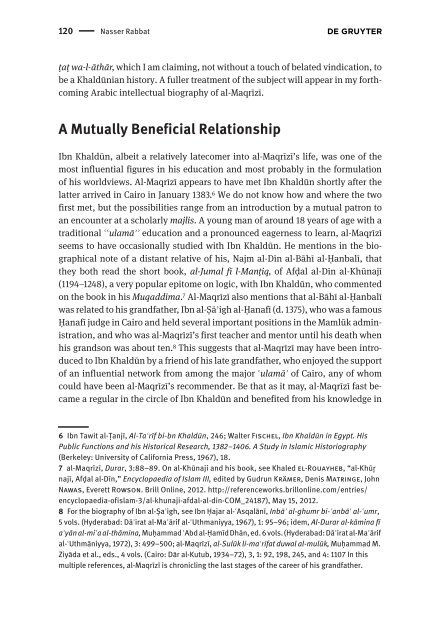0021-1818_islam_98-1-2-i-259
0021-1818_islam_98-1-2-i-259
0021-1818_islam_98-1-2-i-259
Create successful ePaper yourself
Turn your PDF publications into a flip-book with our unique Google optimized e-Paper software.
120 Nasser Rabbat<br />
tat wa-l-athar, which I am claiming, not without a touch of belated vindication, to<br />
be a Khaldunian history. A fuller treatment of the subject will appear in my forthcoming<br />
Arabic intellectual biography of al-Maqr\z\.<br />
A Mutually Beneficial Relationship<br />
Ibn Khaldun, albeit a relatively latecomer into al-Maqr\z\’s life, was one of the<br />
most influential figures in his education and most probably in the formulation<br />
of his worldviews. Al-Maqr\z\ appears to have met Ibn Khaldun shortly after the<br />
latter arrived in Cairo in January 1383. 6 We do not know how and where the two<br />
first met, but the possibilities range from an introduction by a mutual patron to<br />
an encounter at a scholarly majlis. A young man of around 18 years of age with a<br />
traditional ^^ulama## education and a pronounced eagerness to learn, al-Maqr\z\<br />
seems to have occasionally studied with Ibn Khaldun. He mentions in the biographical<br />
note of a distant relative of his, Najm al-D\n al-Bah\ al-0anbal\, that<br />
they both read the short book, al-Jumal fi l-Mantiq, of Afdal al-D\n al-Khunaj\<br />
(1194–1248), a very popular epitome on logic, with Ibn Khaldun, who commented<br />
on the book in his Muqaddima. 7 Al-Maqr\z\ also mentions that al-Bah\ al-0anbal\<br />
was related to his grandfather, Ibn al-Sa#igh al-0anaf\ (d. 1375), who was a famous<br />
0anaf\ judge in Cairo and held several important positions in the Mamluk administration,<br />
and who was al-Maqr\z\’s first teacher and mentor until his death when<br />
his grandson was about ten. 8 This suggests that al-Maqr\z\ may have been introduced<br />
to Ibn Khaldun by a friend of his late grandfather, who enjoyed the support<br />
of an influential network from among the major ^ulama# of Cairo, any of whom<br />
could have been al-Maqr\z\’s recommender. Be that as it may, al-Maqr\z\ fast became<br />
a regular in the circle of Ibn Khaldun and benefited from his knowledge in<br />
6 Ibn Tawit al-Tanj\, Al-Ta^rif bi-bn Khaldun, 246; Walter Fischel, Ibn Khaldun in Egypt. His<br />
Public Functions and his Historical Research, 1382–1406. A Study in Islamic Historiography<br />
(Berkeley: University of California Press, 1967), 18.<br />
7 al-Maqr\z\, Durar, 3:88–89. On al-Khunaji and his book, see Khaled el-Rouayheb, “al-Khunaj\,<br />
Afdal al-D\n,” Encyclopaedia of Islam III, edited by Gudrun Krämer, Denis Matringe, John<br />
Nawas, Everett Rowson. Brill Online, 2012. http://referenceworks.brillonline.com/entries/<br />
encyclopaedia-of<strong>islam</strong>-3/al-khunaji-afdal-al-din-COM_24187), May 15, 2012.<br />
8 For the biography of Ibn al-Sa#igh, see Ibn 0ajar al-^Asqalan\, Inba# al-ghumr bi-#anba^ al-^umr,<br />
5 vols. (Hyderabad: Da#irat al-Ma^arif al-^Uthmaniyya, 1967), 1: 95–96; idem, Al-Durar al-kamina fi<br />
a^yan al-mi#a al-thamina, Mu1ammad^Abd al-0am\d Dhan, ed. 6 vols. (Hyderabad: Da#irat al-Ma^arif<br />
al-^Uthmaniyya, 1972), 3: 499–500; al-Maqr\z\, al-Suluk li-ma^rifat duwal al-muluk, Mu1ammad M.<br />
Ziyada et al., eds., 4 vols. (Cairo: Dar al-Kutub, 1934–72), 3, 1: 92, 1<strong>98</strong>, 245, and 4: 1107 In this<br />
multiple references, al-Maqr\z\ is chronicling the last stages of the career of his grandfather.


